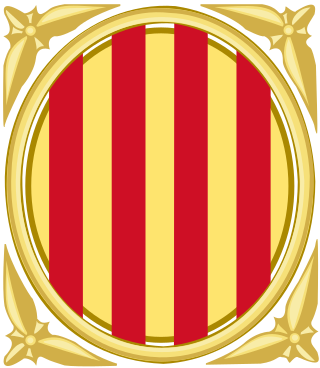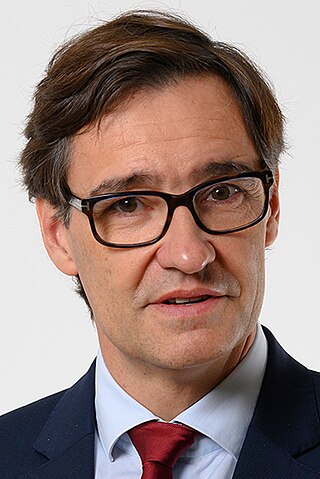
Catalonia is an autonomous community of Spain, designated as a nationality by its Statute of Autonomy. Most of its territory lies on the northeast of the Iberian Peninsula, to the south of the Pyrenees mountain range. Catalonia is administratively divided into four provinces or eight vegueries (regions), which are in turn divided into 42 comarques. The capital and largest city, Barcelona, is the second-most populous municipality in Spain and the fifth-most populous urban area in the European Union.
Generalitat is the name of two major medieval and early modern political institutions and their modern-day analogues in Kingdom of Spain. The ancient Principality of Catalonia and the Kingdom of Valencia were ruled by Generalitats. Today, Catalonia and The Valencian Community have systems of self-government called Generalitats, and are two of 17 autonomous communities of Spain. The term is also used for the government of the semi-autonomous comarca of Val d'Aran, the Generalitat a l'Aran.

Lluís Companys i Jover was a Catalan politician who served as president of Catalonia from 1934 and during the Spanish Civil War.

"Els Segadors" is the official national anthem of Catalonia, nationality and autonomous community of Spain.
The Generalitat de Catalunya, or the Government of Catalonia, is the institutional system by which Catalonia is self-governed as an autonomous community of Spain. It is made up of the Parliament of Catalonia, the President of the Government of Catalonia, and the Executive Council of Catalonia. Its current powers are set out in the Statute of Autonomy of Catalonia of 2006.
The Republican Left of Catalonia is a pro-Catalan independence, social democratic political party in the Spanish autonomous community of Catalonia, with a presence also in Valencia, the Balearic Islands and the French department of Pyrénées-Orientales. It is also the main sponsor of the independence movement from France and Spain in the territories known as Catalan Countries, focusing in recent years on the creation of a Catalan Republic in Catalonia proper. Its current president is Oriol Junqueras and its secretary-general is Marta Rovira. The party is a member of the European Free Alliance.

The Executive Council of Catalonia or the Executive Government of Catalonia is the executive branch of the Generalitat of Catalonia and its main collective decision-making body. It is responsible for the political action, regulation, and administration of the government of the autonomous region.

The Commonwealth of Catalonia was a deliberative assembly made up of the councillors of the four provinces of Catalonia. Promoted in its final stages of gestation by the Regionalist League of Catalonia, it was strongly endorsed by municipal referendum in October 1913.

The Parliament of Catalonia is the unicameral legislature of the autonomous community of Catalonia. The Parliament is currently made up of 135 members, known as deputies, who are elected for four-year terms or after extraordinary dissolution, chosen by universal suffrage in lists of four constituencies, corresponding to the Catalan provinces. The Parliament building is located in Ciutadella Park, Barcelona.

The Palace of the Generalitat of Catalonia is a historic palace in Barcelona, Catalonia, Spain. It houses the offices of the Presidency of the Generalitat de Catalunya. It is one of the few buildings of medieval origin in Europe that still functions as a seat of government and houses the institution that originally built it.
The Statute of Autonomy of Catalonia is a constitutional law defining the region of Catalonia as an autonomous community within the Kingdom of Spain. It was promulgated on 18 September 1979. It is one of seventeen such statutes granted, in various forms and capabilities, to the different autonomous communities of Spain since the Spanish transition to democracy of the 1970s. On 18 June 2006 a referendum altering the statute to expand the authority of the Catalan government was approved; it became effective on 9 August 2006.
The Statute of Autonomy of Catalonia of 2006 provides Catalonia's basic institutional regulations under the Spanish Constitution of 1978. It defines the rights and obligations of the citizens of Catalonia, the political institutions of the Catalan community, their competences and relations with the rest of Spain, and the financing of the Government of Catalonia.

The Statute of Autonomy of Catalonia of 1932, also called the Statute of Núria, was the first implemented statute of autonomy for Catalonia, officially providing self-government to Catalonia for the first time in more than 200 years. The Statute was promoted by the then acting President of the Generalitat, Francesc Macià and approved in a referendum by 99% of Catalan voters. The draft Statute was completed on 20 June 1931 in Núria and finally approved in the Spanish Parliament on 9 September 1932. It was implemented until the occupation of Catalonia by the Nationalist Army during the last stages of the Spanish Civil War, in 1939.

The 2021 Catalan regional election was held on Sunday, 14 February 2021, to elect the 13th/14th Parliament of the autonomous community of Catalonia. All 135 seats in the Parliament were up for election.

Joaquim Torra i Pla, known as Quim Torra, is a Catalan lawyer and journalist from Spain. He served as President of the Government of Catalonia from 17 May 2018 to 28 September 2020, when the Supreme Court of Spain confirmed a court ruling by the High Court of Justice of Catalonia condemning him for disobeying the Central Electoral Board during the April 2019 general election, leading to his disqualification from office.

Pere Aragonès i Garcia is a Catalan lawyer and former politician who served as President of the Government of Catalonia from 2021 to 2024. He previously served between 2018 and 2021 as Vice President and Minister of Economy and Finance of Catalonia, as well as Acting President between September 2020 and May 2021. He is a member of the Republican Left of Catalonia (ERC) political party.

Ernest Maragall i Mira is a Spanish economist, politician, member of the Parliament of Catalonia and former Minister of Foreign Action, Institutional Relations and Transparency of Catalonia. He was previously Minister of Education, a member of the European Parliament and a member of Barcelona City Council (BCC).

Josep Rull i Andreu is a Spanish politician from Catalonia serving as President of the Parliament of Catalonia since June 2024. He previously served as the Counselor of Territory and Sustainability of Catalonia at the Government of Carles Puigdemont between 2016 and 2017, when Spanish Rajoy's Government ceased the Catalan executive following the Catalan declaration of independence amid the application of Article 155 of the Spanish Constitution. Between 2 November and 4 December 2017, Rull was jailed and again on 23 March 2018. He was a member of the Catalan Parliament but on 10 July 2018 a Supreme Court judge suspended him as a deputy.

The 2024 Catalan regional election was held on Sunday, 12 May 2024, to elect the 15th Parliament of the autonomous community of Catalonia. All 135 seats in the Parliament were up for election.

The government of Salvador Illa was formed on 12 August 2024 following the latter's election as President of the Government of Catalonia by the Parliament of Catalonia on 8 August and his swearing-in on 10 August, as a result of the Socialists' Party of Catalonia (PSC) being able to muster a majority of seats in the Parliament with external support from the Republican Left of Catalonia (ERC) and Commons Unite following the 2024 Catalan regional election. It succeeded the Aragonès government and has been the incumbent Government of Catalonia since 12 August 2024, a total of 18 days.
















